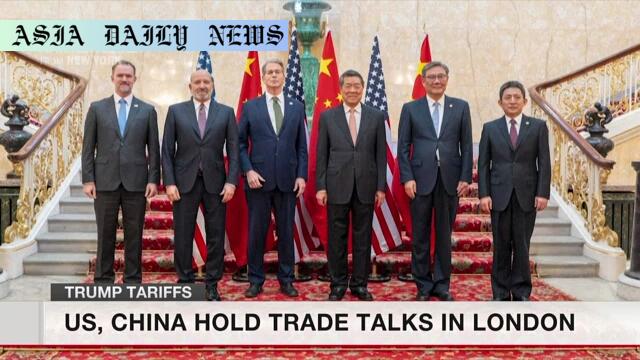Trade Talks: US and China engage in critical talks in London focusing on tariffs and rare earth exports.

Introduction
The United States and China engaged in a significant round of trade talks in London on Monday, signaling potential progress amidst ongoing tensions affecting global markets. The high-level discussions brought together key officials from both sides, with the US Treasury Secretary Scott Bessent, Commerce Secretary Howard Lutnick, and Trade Representative Jamieson Greer meeting their Chinese counterparts, Vice Premier He Lifeng and Commerce Minister Wang Wentao. Rare earth exports—a contested issue with strategic and economic implications—dominated the agenda, underscoring the complexity of the US-China trading relationship.
Rare Earth Exports and Economic Leverage
Rare earth minerals are critical components in modern technology, ranging from electric vehicles to smartphones and renewable energy systems. China, as the largest producer of these resources, wields significant influence in how global supply chains operate. Recent restrictions on rare earth exports from Beijing have rung alarm bells in Washington, prompting the US to ramp up diplomatic efforts. This particular issue holds substantial significance in the discussions, given the broader implications for supply chain resilience and key industries in the US.
Recent Agreements and Persistent Tariff Barriers
Monday’s meeting was a continuation of breakthroughs achieved in Geneva last month, where both nations agreed to temporarily reduce tariffs on some products for 90 days. This temporary measure has been viewed as a positive step toward a more stable trading relationship. However, entrenched disagreements persist, particularly regarding China’s industrial policies and perceived lack of equitable trade practices. As negotiations continue into Tuesday, both sides need to address these sticking points to solidify any progress.
Diplomatic Engagements at the Leader Level
The London talks were preceded by a direct phone conversation between US President Donald Trump and Chinese President Xi Jinping last week. Both leaders expressed interest in resolving ongoing issues through a negotiated settlement, empowering their respective trade teams to expedite discussions. The combined efforts at both leadership and ministerial levels underscore the priority both nations are placing on rectifying trade imbalances and ensuring economic stability.
Global Implications
As two of the world’s largest economies, the US and China have far-reaching impacts on global trade and economic trends. The resolution—or further escalation—of these discussions will resonate well beyond their borders. Particularly, the debate surrounding rare earth exports has left other nations contemplating the security of their resources and supply chains. Should the two countries find common ground, it could pave the way for improved economic recovery and cooperation across industries worldwide.
Conclusion
The ongoing trade talks in London mark an important moment in US-China relations. While progress has been made in reducing some tariffs, challenges remain in addressing rare earth trade issues and ensuring fair practices. Both parties must approach these discussions with compromise and long-term solutions in mind, recognizing the global stakes tied to their decisions. The world is watching closely as these two giants negotiate a path forward, hoping that diplomacy, rather than confrontation, prevails.
Commentary
The Importance of Rare Earth Minerals in Trade Negotiations
The emphasis on rare earth exports during the recent trade talks showcases the strategic importance these resources hold—not just for the US and China, but for the entire world. With these minerals being the backbone of technological and renewable energy advancements, securing a stable supply chain remains vital. China’s dominant position in this sector gives it significant leverage, making its export restrictions a contentious issue for countries like the US that rely heavily on these materials.
The Potential of Progress Amidst Lingering Challenges
While the trade talks in London demonstrate incremental progress, the deeper issues of tariff structures and equitable trade practices loom large. The temporary nature of the Geneva agreement reflects the fragile state of these negotiations. For sustained progress, both nations need to find innovative ways to reconcile competing economic and industrial priorities while fostering a mutually beneficial relationship. Any misstep on either side could lead to a prolonged economic standoff, affecting global markets in unpredictable ways.
Collaboration as the Key to Economic Recovery
In a time when the global economy faces various pressures—ranging from inflation to supply chain disruptions—the US and China bear the responsibility of steering their trade relationship in a constructive direction. Collaborative efforts toward tariff reductions and equitable market practices can serve not just their domestic interests but also benefit players across the global economic spectrum. Complex as the issues may be, open dialogue and long-term vision are essential to resolving these critical matters and fostering economic stability worldwide.


